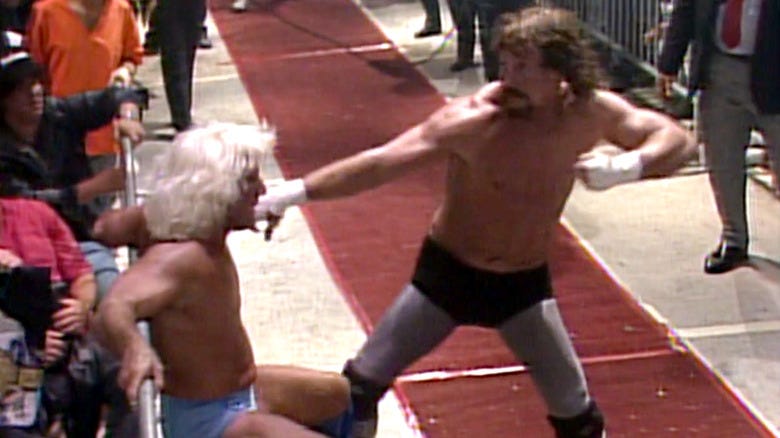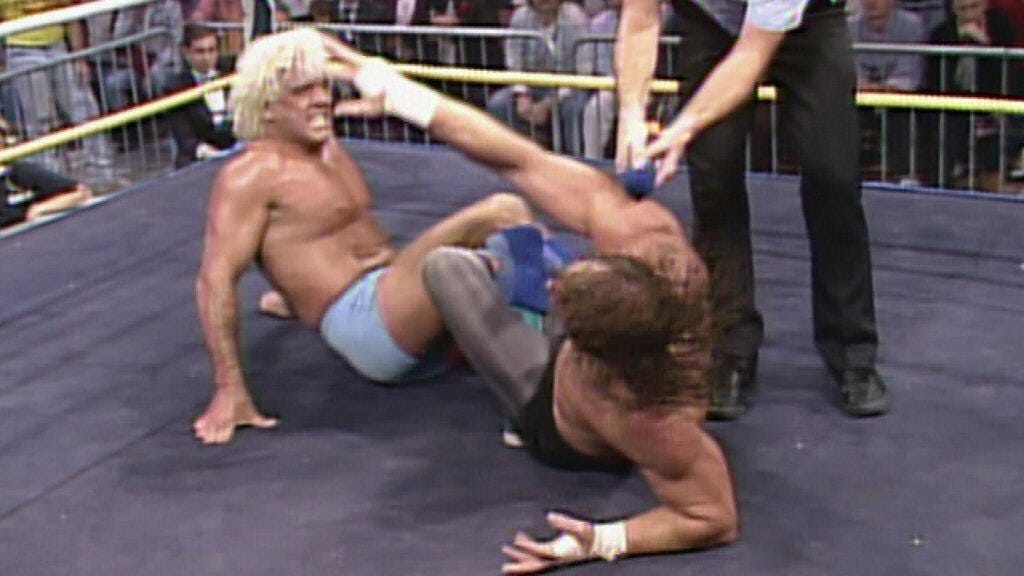Terry Funk vs. Ric Flair I Quit Match Review
On the power of stakes, emotional resonance, and a heel's hypocrisy
Stakes are essential when engaging in professional wrestling’s suspension of disbelief. Without purpose and consequence, wrestling works less as a morality play and more like Cirque du Soleil, impressive athletic feats with a singular focus on entertainment. Despite wrestling’s ever-changing form, its successes are predicated on emotional resonance. Terry Funk and Ric Flair’s 1989 feud is regarded as one of the greatest ever because of its insistence on upping the stakes. When Funk returned with the timekeeper’s table piledriver, he introduced fans to a level of violence hardly seen on American television. After Flair defeated Funk at the Great American Bash in a bloody war of attrition, he did not rest on his laurels, but brawled with Funk until WCW’s pay-per-view time ran out and they cut the cameras. Flair had already defended his world championship, and by deciding to continue to fight, he raised the stakes above the belt. The brawl to end the Bash signified both’s desires extended far beyond the tangible and into something deeper, more personal, more emotional.
To accentuate this, Funk’s next attack on Flair made the piledriver seem tame. At Clash of the Champions 8, Funk infamously threw a plastic bag over Flair’s head in an act best described as attempted homicide. Funk’s derangement exceeded a world championship slighting. It bordered on insanity. No longer could a pinfall victory quell either man’s hatred. They wanted to make the other say “I quit”, to steal their pride, to physically hurt them to the point of psychological breakage. To say the stakes were high at Clash of the Champions 9 would be an understatement.
Before the match begins, Jim Ross declares that if Flair can make Funk say “I quit”, Funk will shake Flair’s hand and call him the better man. Terry Funk then grabs the house microphone and gives Flair the opportunity to quit before the match begins. Flair declines and a strong lockup sends them bouncing around the ring. A single Flair chop leaves Funk fuming on the outside as he throws errant punches at fans and stalks around ringside in a mad haze. Flair controls the momentum as they brawl around ringside with an array of chops and strikes. Back in the ring, Funk finds an advantage and lays down stomps. Now in control, Funk continues with strikes and shoots Flair into the guardrail. He posts him in the corner and attacks him with punches all the while begging Flair to quit. Throughout, the use of the microphone presents an auditory experience that is subdued in most matches. Along with Funk’s wild punches, we hear the desperation in his voice. Chaos created through sensory overload.
Funk faces immediate comeuppance for his brazen declarations as Flair drops him with an inverted atomic drop. Flair cannot capitalize on the maneuver as Funk holds the ropes on an Irish whip and returns with a swinging neckbreaker. Terry Funk feels powerful now, and shows it with a series of taunting slaps to Flair’s face. This wakes up the Nature Boy, who chokes Funk and sends him scrambling to the outside with a flurry of chops. The once brash and menacing cowboy now cowers with fear. Flair fights back with every ounce of strength, the chops ringing out across the arena as he turns the tide of the match with urgency and intensity, even getting physical with Funk’s manager Gary Hart.
Flair asks Funk to quit but Hart taunts Flair with the branding iron, allowing Funk to attack him from behind. Even without the regular structure of a standard match, Funk incorporates logical heel cut-off spots that create the same effect. Often, especially in the modern day, hardcore or No DQ matches reject the basic match plot structure in favor of a back and forth highspot affair. Funk and Flair do not neglect their heat/comeback, and instead find more creative ways for cutoffs and workarounds that still involve the heel “cheating” despite relaxed rules. Hart’s involvement also inspires it. Funk focuses on Flair’s neck with a second swinging neckbreaker and asks, “Don’t you want to quit before I hurt you?”.
Making good on his promise, Funk places Flair in the piledriver position, begs him to quit again, and then performs the move when he resolves to continue. Flair will not quit so Funk teases a second piledriver on the entranceway. He lands the move and the once great stakes rise again as Flair is now in peril. The raucous arena hushes and Flair returns the referee’s “Do you quit?” with silence. In the opening minutes, Funk’s trashtalking on the house microphone invited the audience to participate in the cacophony of threats and sounds of combat. After the second piledriver, the contrasting silence evokes an unsettling eeriness, a collective admittance of defeat. It is comparable to Jon Moxley’s defeat of Bryan Danielson at WrestleDream 2024 once the crowd realized they just witnessed Danielson’s final match. Through Flair’s inability to respond through the microphone, the crowd loses their belief in his victory. The Funker is just too heinous, too hellbent on revenge to be tamed. His pride has been questioned. His family’s legacy has been questioned. Maybe the audience pushed him too far. Maybe it is their fault.
Terry Funk uses the microphone as a weapon and leans the timekeeper’s table on the apron. This brief period of “rearranging furniture” causes Funk to face his comeuppance as Flair returns with chops, then throws Funk headfirst into the table. Another excellent use of wrestling psychology here as Flair refrains from using any weapon until after Funk provokes him with them. The babyface should not take the easy way out until the heel attempts to first and fails. Funk attempts to leave and Flair flies onto his back and they careen into the barricade. A brilliant moment of improvisation follows as he throws Funk over the table and the Funker slides off it face first into a steel chair.
Hart runs fans away from Funk and Flair elbows him. Flair crotches Funk on the guardrail and chops him. Funk performs his signature “knee walk” and “spin on the ground” sells. Flair knee drops him and Funk falls out of the ring face first. Terry Funk’s bumps and selling here confirm the belief that Flair, as the babyface, is the superior wrestler. By selling big, a heel proves themselves inferior based strictly on ability. Throughout this entire match, Funk never hits harder, looks more athletic, or behaves smarter than Flair. He gains advantages with low dirty tricks, cowardice, and an aggression that wanes once Flair takes control.
And the aggression does wane as Flair lands an inverted atomic drop and focuses on Funk’s leg. After begging Flair to quit just moments prior, Funk now attempts to bail on the entranceway, yet Flair tackles him and brings him back into the ring with a stalling suplex. Funk blocks the figure four by gouging the eyes but faces stiff comeuppance as Flair suplexes him spinefirst on the apron. Funk misses punches and Flair connects with chops. Flair locks on the figure four and the referee holds the microphone to Funk who cries “Never!” before giving up just moments later to a huge ovation. True to his word, Funk shakes Flair’s hand.
Funk is more than a heel here. He is a hypocrite down to his final words. The crowd hates Terry Funk because he subverts their expectations and ultimately lets them down. No one expects the deranged and unpredictable West Texas cowboy to tuck his tail between his legs and run away when the going gets tough. And that’s exactly what Funk does this entire match. On the contrary, Ric Flair does not style, profile, strut, or woo during this contest. He matches Funk’s derision, lunacy, and lies with intensity, grit, willingness, passion, and a fighting spirit that brings the crowd from the abyss of hushed defeat to a jubilant victorious uproar. It is through Flair’s peril after the second piledriver that the stakes leading into the match are fully realized. From there, the morality play grips us and yanks us around until those glorious final moments when Flair locks on the figure four, Funk declares his hypocrisy, and the Nature Boy succeeds. It is a moment of relief, of exhalation, and of the uncontrollable sound Funk tried to steal away.



